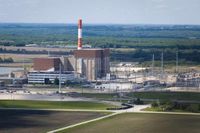In a landmark deal announced on June 3, 2025, Meta Platforms, the parent company of Facebook and Instagram, has signed a 20-year power purchase agreement (PPA) with Constellation Energy, the largest nuclear power plant operator in the United States. This unprecedented agreement marks the first time a company has committed to buying all the electricity generated by a single nuclear power plant—in this case, Constellation’s Clinton Clean Energy Center in Illinois. Starting June 2027, Meta will purchase 1.1 gigawatts (GW) of nuclear energy, enough to power approximately 750,000 homes, supporting its ambitious clean energy and artificial intelligence (AI) initiatives.
The deal comes at a crucial moment for the Clinton plant, which was facing potential closure in 2027 due to the expiration of Illinois’ Zero Emission Credit (ZEC) program, a state-funded initiative that has financially supported the plant since the Future Energy Jobs Act prevented its premature shutdown in 2017. With Meta stepping in as a long-term buyer, Constellation plans to apply for federal relicensing to extend the plant’s operations for another two decades, securing jobs and economic stability in the region.
Joe Dominguez, CEO of Constellation Energy, drew parallels between this deal and the reopening of the Crane Clean Energy Center, which closed in 2019, resulting in significant job losses, reduced tax revenue, increased pollution, and higher energy prices. Dominguez said, “We all know that the closure cost our community jobs, tax revenue, more pollution and higher prices.” The new agreement not only preserves over 1,100 high-paying jobs but also adds an estimated $13.5 million in annual tax revenue, a boon for local economies.
While the Clinton plant’s output will increase by 30 megawatts through planned upgrades, the energy generated will feed into the regional grid rather than powering Meta’s data centers directly. Nevertheless, this supports Meta’s broader goal of matching 100% of its electricity use with clean energy sources. Urvi Parekh, Meta’s head of global energy, emphasized the importance of the deal for the company’s AI ambitions, stating, “Securing clean, reliable energy is necessary to continue advancing our AI ambitions.”
Meta’s investment in nuclear energy reflects a strategic pivot towards reliable, carbon-free power sources capable of meeting the massive electricity demands of AI and hyperscale data operations. Unlike intermittent renewables such as solar and wind, nuclear power provides consistent output, making it an ideal partner for technologies requiring steady, high-capacity energy inputs. Earlier in March 2025, Meta had signed the World Nuclear Association’s Large Energy Users Pledge, committing to triple global nuclear capacity by 2050, signaling a long-term commitment to nuclear energy as part of its sustainability strategy.
The Meta-Constellation deal has sent ripples across the energy sector, with Constellation’s stock surging 12% in premarket trading on the day of the announcement, hitting a five-month high of $340 per share and pushing its market value past $100 billion. Other nuclear-focused companies also experienced gains: NuScale Power’s shares rose 7.3%, Oklo Inc. jumped 7.6%, and Vistra Corp. climbed 5.5%, reflecting renewed investor confidence in nuclear energy’s role in the clean energy transition.
Constellation Energy has been a standout performer on Wall Street amid the AI boom, delivering a remarkable 230% return to investors since the late 2022 release of OpenAI’s ChatGPT chatbot, far outperforming the S&P 500’s 51% return during the same period. This surge underscores how AI’s voracious appetite for energy is reshaping corporate America’s energy sourcing strategies.
President Donald Trump’s recent executive order, signed on May 23, 2025, aims to quadruple U.S. nuclear energy capacity by 2050, further bolstering the industry. Trump, flanked by Dominguez at the press conference, declared, “It’s time for nuclear,” highlighting the government’s commitment to accelerating new reactor approvals and strengthening fuel supply chains.
The economic and environmental stakes tied to the Clinton plant are significant. Employing over 530 workers, the facility generates enough carbon-free electricity to power over 800,000 homes, a figure slightly higher than the 750,000 homes powered by the Meta deal alone. An analysis by The Brattle Group found that shuttering the plant would increase carbon emissions by more than 34 million metric tons over 20 years—the equivalent of putting approximately 7.4 million gasoline-powered cars on the road for a year.
Illinois Representative Mary Miller praised the deal, stating, “Extending the plant’s operating license will preserve over 1,000 high-paying jobs for the next 20 years, providing long-term economic security and growth.” Such endorsements reflect the broader community and political support for nuclear energy as a vital component of regional economic health and the fight against climate change.
Financially, Constellation Energy’s stock has been on an upward trajectory, gaining 40.56% year-to-date and 54.29% over the past 12 months. Analysts remain optimistic, with TipRanks’ AI-powered investor tool Spark rating CEG stock as Outperform with a $324 price target, implying a modest upside. The consensus among Wall Street analysts is a Moderate Buy, with an average price target around $301.30, indicating a balanced outlook on the stock’s near-term prospects.
The Meta-Constellation agreement also fits into a larger pattern of tech giants investing heavily in nuclear power to meet their growing energy needs sustainably. Last year, Constellation restarted Pennsylvania’s Three Mile Island Unit 1 nuclear plant under a 20-year supply deal with Microsoft, and other tech companies like Alphabet’s Google and Amazon Web Services are similarly exploring nuclear energy partnerships.
As AI technologies continue to expand, their energy demands are expected to skyrocket. Meta anticipates spending between $64 billion and $72 billion in capital expenditures this year alone to build out its generative AI infrastructure. Reliable, carbon-free energy sources like nuclear power are becoming indispensable to support this growth without exacerbating climate change.
In sum, Meta’s 20-year nuclear energy deal with Constellation Energy is a pivotal moment in the intersection of technology, clean energy, and economic development. It not only secures a stable, carbon-free energy supply for Meta’s AI ambitions but also ensures the survival and modernization of a critical nuclear facility, preserving jobs and tax revenues while contributing to broader climate goals. As the AI revolution fuels unprecedented energy needs, nuclear power is poised to reclaim its place as a cornerstone of the clean energy future.





